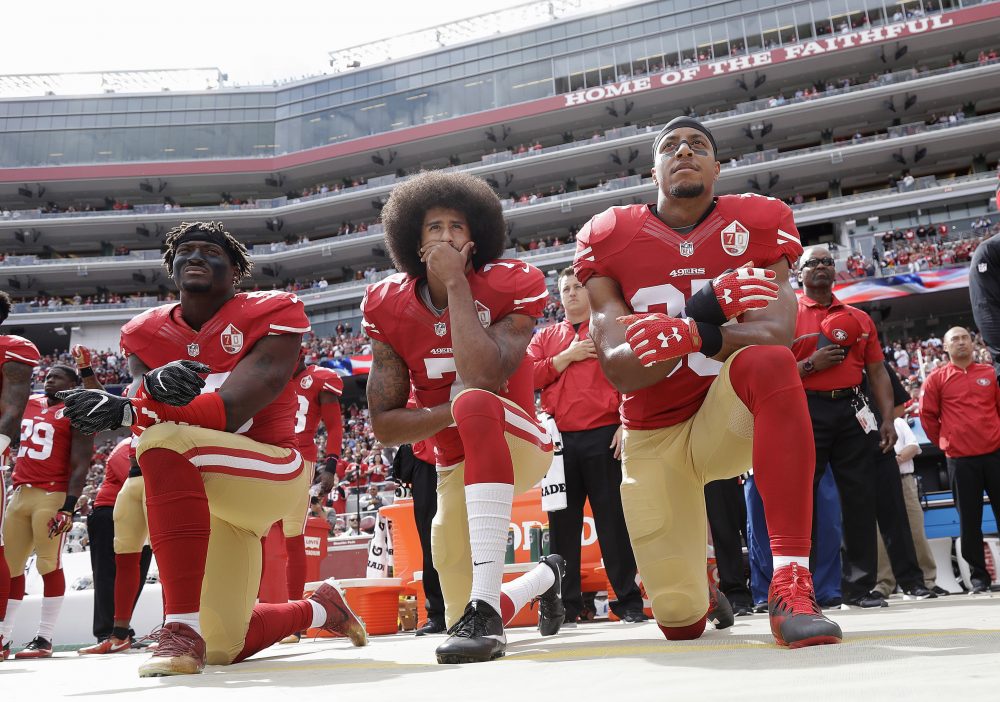Advertisement
Free Speech And The Politics Of Football

This week on Freak Out And Carry On, Ron Suskind and Heather Cox Richardson respond to President Donald Trump's attacks on football players who kneel during the national anthem. They're joined by Slate staff writer Isaac Chotiner and discuss the debate around free speech on football fields and college campuses, the racial dynamic surrounding Trump's comments, and the long history of the military's involvement with football.
Excerpts
Ron Suskind: There is nothing sacred anymore in America. I shouldn't think anything is free at this point, from being corrupted by Donald Trump and his tweets of deep division. I'm a football fan. I grew up with it. Sports are a shared realm in American life, where rich, poor, black and white can get together around something, anything! I could be cheering next to somebody from a different race or class, week after week, Sunday after Sunday, on the football fields. So let's review a quick timeline. Last year, several football players led by then-San Francisco 49ers quarterback Colin Kaepernick, took a knee during that national anthem at football games, to protest the treatment of black people in the United States. Then on Friday, at a rally in Alabama, President Trump went on the offensive against the National Football League. And then of course he went to Twitter and attacked the NFL more for days. The man can't stop. To Trump, politics and the presidency are a kind of game in some ways. That's why I think he plays it so forcefully. So while there is a possible humanitarian crisis in Puerto Rico, while Houston and Florida are still recovering, while North Korea is threatening nuclear war, our president is in a Twitter feud with people who move a ball back and forth across the field.
Heather Cox Richardson: I'm fascinated by his attack on the NFL because when I saw him going after the NFL I thought this is the first time he's made a mistake in the way he approaches his presidency. And I don't think he reads the football audience terribly well. Where I think he tripped is that Trump has his own long history with the NFL. He tried to acquire the Buffalo Bills and they refused him. And back in the 1980s he was part of the United States Football League, which nobody today remembers or maybe has heard of, because he was one of the key reasons that that football league failed. Having that failure hung around his neck from the world the football all these years has obviously really really rankled.
And isn't it great that on the same day that Trump's Attorney General Jeff Sessions said that we have to protect freedom of speech on college campuses, Donald Trump tweeted that the NFL should set a rule that you can't knell during our national anthem. So much for his free speech there! He's trying to constrain freedom of speech at football games on the same day his attorney general is saying that college campuses need to make sure that there is plenty of room for conservative free speech on them. That was really the takeaway moment.
Isaac Chotiner: I wouldn't quite say that Donald Trump is attacking the NFL. I mean, he did attack the NFL. But I think, for most people who like Donald Trump, most of his admirers, they don't perceive what he's doing as attacking the NFL. They perceive him as attacking rich, pampered, black--black being the crucial word--athletes. Thinking about it that way is probably more helpful if you want to understand what Trump is doing because I think that this is part of the culture war he's been playing for five-plus years. It's part of when he said that President Obama wasn't born in the United States and shouldn't have been a legitimate president essentially. Even in football-loving America where these black athletes are are often on posters on your kid's wall, I still think that the racial dynamics are such that a lot of Americans unfortunately see rich, black athletes as pampered, elite figures who are disconnected. They think that they don't understand the sacrifices that soldiers have made and why you should kneel for the flag. I'm not saying it's the smartest attack Trump has ever made although I do think probably a lot of people feel the way he does about kneeling for the flag.
Heather Cox Richardson: American football really takes off, in part, because of an attempt to Americanize American Indians, Native Americans. The government wanted to take American Indians off the reservations and turn them into good American citizens and good American soldiers. Football starts in a number of places but it really takes off at Carlisle Indian School which is a reservation high school in Pennsylvania designed to get the American Indians off the reservation and into an Americanized system. Carlisle Indian School was actually run by a civil war general and one of the things he wanted to do was to get the Indians into some sort of a regimented form. He figured he could encourage them to be militarized through games and the game that he chose was football. The football team really take off for the Carlisle Indian school when they get a new coach whose name is Glen Warner or "Pop" Warner. Pop Warner turns those American Indian kids into such powerful fighting force that they set up a couple of demonstration games against some of the best teams in the country, including West Point. And the game that is still legendary in American history is the Army-Carlisle game of 1912 was the game where Jim Thorpe, one of the greatest athletes in American history played for Carlyle against West Point and Dwight David Eisenhower.
The views and opinions expressed in this podcast are solely those of the participants and do not in any way reflect the views of WBUR management or its employees.
